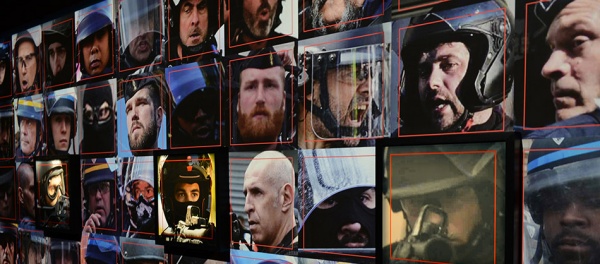What's the difference between bad students and cops?
Probably none anymore, as far as face recognition is concerned.

Two days ago I re-explained how, with “free” social media and “smart” apps, the product is not you as much as your friends, even in court. The day before, I had warned about students (or anybody else) who “archive” footage for FUTURE calling out. Today, I offer you another reason to read those posts, and of the necessity of broader education, personal awareness and general accountability about face recognition.
Quick: what’s the NAME of that cop?
Thanks to affordable computing, in fact, those techniques mays soon be widely applied also against law enforcement officers. But not by other law enforcement officers, or courts.
Three months ago, the New York Times reported something immediately commented by this and many other websites, namely:
Face recognition in riots. Of cops, this time
“In order to hold police accountable when they try to hide their identities, a growing number of activists” is doing the same things the police is already experimenting with: "[develop] facial recognition tools that identify cops", thanks to “increasingly common off-the-shelf software”.
What this means, in practice
“Bottom-up” face recognition of cops has been defined “a satisfying role reversal”.
Concretely, it means that the officer kneeling to death on George Floyd could have been identified by anybody, even if he had been masked during that episode.
In perspective, it means the same exposure, potentially, for every cop who, during any future riot, anywhere, keeps hitting a rioter even when she’s already fallen wound, or is otherwise harmless.
It means that any mobster worldwide could do the same to identify a particularly “obnoxious”, but especially annoying officer investigating his activities.
It means all this, potentially, for every cop that has ever posted any picture of his face on any social media. Or, just like the woman whose story I told Saturday, was ever tagged in photos shared online by any of his contacts.
Because the real challenge here is not the technology. It is “finding enough images of local police to train the algorithm." But the activists working on this project “have had luck on social media”. For details, read the links, or browse the “Capture” Project by Paolo Cirio, where I took the screenshots for this post.
Makes one think, isn’t it? Especially cops. And lawmakers.
Who writes this, why, and how to help
I am Marco Fioretti, tech writer and aspiring polymath doing human-digital research and popularization.
I do it because YOUR civil rights and the quality of YOUR life depend every year more on how software is used AROUND you.
To this end, I have already shared more than a million words on this blog, without any paywall or user tracking, and am sharing the next million through a newsletter, also without any paywall.
The more direct support I get, the more I can continue to inform for free parents, teachers, decision makers, and everybody else who should know more stuff like this. You can support me with paid subscriptions to my newsletter, donations via PayPal (mfioretti@nexaima.net) or LiberaPay, or in any of the other ways listed here.THANKS for your support!